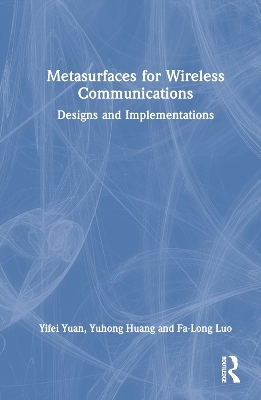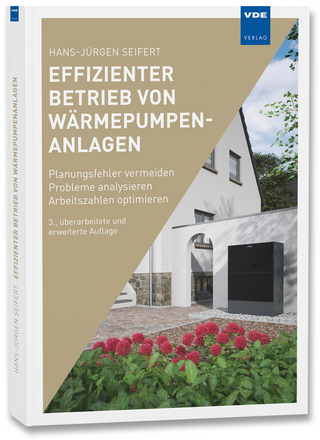
Metasurfaces for Wireless Communications
CRC Press (Verlag)
978-1-032-45661-4 (ISBN)
This book provides a comprehensive coverage of reconfigurable intelligent surface (RIS) based wireless communications by covering all the technology stages from working principles, theories and algorithms, system architectures, real-world implementations, and programming platforms through performance measurements and system testing. Metasurfaces for Wireless Communications: Designs and Implementations serves as a must-be read for everything related to the use of RIS in wireless networks.
Authored by three experts in the field, the book is organized into five in-depth and well-designed chapters. The first chapter discusses the fundamentals of metasurfaces for wireless communications as well as the related evolution and requirements of RIS in 6G. The second chapter is devoted to the modeling and analyses of RIS for wireless communications by including electromagnetic field modeling and theoretical analyses of both large- and small-scale channel models. In Chapter 3, the authors mainly address properties’ characterizations and system design of metasurface devices. Chapter 4 examines relay and system implementations of RIS for wireless communications through basic system models, key design aspects, and system simulations and architectures. Chapter 5 discusses the standardization of RIS-aided wireless communications by providing an overview of the relay technologies, field trials, and roadmaps in 3GPP standardizations.
This book serves not only as a comprehensive reference for professional engineers, researchers, manufacturers, network operators, software developers, service providers, and regulatory bodies aiming at the development, standardization, deployment, and applications of B5G and 6G mobile communications, but also as a textbook for graduate students in circuits, signal processing, wireless communications, information theory, microwave technology, and antenna and propagation.
Dr. Yifei Yuan holds the title of Chief Expert of China Mobile Research Institute. He received his Bachelor & Master degrees from Tsinghua University, of China, and a Ph. D degree from Carnegie Mellon University, USA. He was with Alcatel-Lucent from 2000 to 2008, working on 3G/4G key technologies. From 2008 to 2020, he was with ZTE as technical director and Chief Engineer, responsible for standards research on LTE-Advanced and 5G. Since January 2020, he has been with China Mobile Research Institute, responsible for advanced research of 6G air interface. His research interests include MIMO, channel coding, non-orthogonal multiple access (NOMA), internet-of-things (IoT), and their standardizations in 3GPP with receiving worldwide attention and recognition. He has more than 80 journal/conference papers and 150 granted patents. He is the Editor-in-Chief of Hans Wireless Communications, an Editor of IEEE Communications Letters and an Editor of China Communications. He is the leading Guest Editor of Special Issue on Reconfigurable Intelligent Surface (RIS) of ZTE Communications (Vol. 20, No.1, 2022) and TPC member of GLOBECOM 2022 RIS symposium (on going). He serves as Industry Liaison Officer of IEEE Emerging Technology Initiative (ETI) on RIS. Yuhong Huang is the General Director of China Mobile Research Institute where she has been since 1996, Mrs.Yuhong Huang also serves as a member of Board of Directors of NGMN and O-RAN alliance. She received her Bachelor & Master degrees from Beijing University of Posts and Telecommunications, of China. She has been a China national technical leader with being responsible for GSM, WLAN, 3G through to 5G and 6G research and development. She won 20 awards from China Central Government, including a National Special Prize for Scientific and Technological Progress on 4G TD-LTE (7th contributor). She has been admitted to “The New Century Talents Project” and granted the honors of “Young Professionals with Outstanding Contributions” and “National Model Worker” in China. She also serves as the Secretary General of GTI. She has submitted over 600 contributions to standards meetings of 3GPP, ITU, etc. She has led or participated 8 national industry research projects. Dr. Fa-Long Luo is the Chief Scientist of Micron Technology Inc., USA and IEEE Fellow, Dr. Luo is now also an Affiliate Full Professor of Electrical Engineering Department at the University of Washington in Seattle. He has 39 years academic, industry and research experience with emphasis on the translation of adaptive signal processing techniques to practical applications and commercial products related to wireless communications, multimedia and digital broadcasting.
Preface
About the Authors
Chapter 1: Fundamentals of Metasurfaces for Wireless Communications
Introduction of Metamaterial and Metasurface
Evolutions of Reconfigurable Intelligent Surface (RIS)–Related Wireless Technologies
Multi-Antenna Technology
Coordinated Multi-Point Processing (CoMP)
Micro/Pico/femto Cells
Relay
System Performance Requirements for 6G
Application Scenarios
Key Performance Indicators
Basics about Performance Evaluation Methodologies
Chapter 2: Modeling of a RIS for Wireless Communications
Overview of Channel Models for Mobile Communications
Large-Scale Fading Models
Small-Scale Fading Models
Spatial Channel Models
Simplified Model for Spatial Channels
Antenna Models and Configurations
Large-Scale Channel Models for a RIS
Free-Space Pathloss Models for a RIS
More Realistic Large-Scale Fading Models for RIS
Small-Scale Channel Models for RIS
Electromagnetic Field Modeling of Metasurface Structures
Chapter 3: Designs of Metasurface Devices
Basic Design Principles of Metasurface Devices
Typical Metamaterials and Devices
Basic Structures of Metamaterial Devices
Design Principles of Metasurface
Active RIS Elements
Simulations and Measurements of Metasurface Devices
Electromagnetic Simulations
Performance Testing of Actual Devices
Control of Metasurface Devices
Non-Ideal Characteristics
Control Mechanisms of Tunable Metasurface
Codebook Designs of the RIS
Uniqueness of Codebook Design for the RIS
Examples of the RIS Codebook Designs
Near-Field Communications
Near-Field Basics
Polar Coordinates for the Near-Field
Beam Squinting in Wideband Operation and Solutions
Metasurface-Based Beamforming at the Base Station
Chapter 4: System Implementations of a RIS for Wireless Communications
Basic System Models and Performances for Metasurface-Based Relay
System Models
Theoretical Performance Analysis
Simplified Model and Performance Analysis
Beamforming Techniques for a RIS
Beam-Based Techniques
Random-Sampling-Based Technique
RIS Channel Estimation and Feedback for Small-Scale Fading
Direction Finding Via Time-Space Coding
Link-Level Simulations
Simulation Parameters and Methodology
Preliminary Link-Level Simulation Results
System-Level Simulations
System Configurations and Simulation
Preliminary Simulation Results
Chapter 5: Standardization and Trials of RIS-Aided Wireless Communications
Overview and Key Features of Relay Technology in Standardization
Potential Deployment Scenarios
Basic Categories of an LTE Relay
Type 1 Relay
Type 2 Relay
Brief Discussion on an LTE Full-Dimensional MIMO
Field Trials
RIS Trial in Nanjing
RIS Trial in Shenzhen
Standardization Road Map for the RIS
Lessons Learned from the LTE Era
Different Modes of Operation for the RIS
3GPP Release 18 Network-Controlled Repeater
Comparison Between Network-Controlled Repeater and RIS
Future Road Map for RIS Standardization
Index
| Erscheinungsdatum | 25.04.2024 |
|---|---|
| Zusatzinfo | 45 Tables, black and white; 10 Line drawings, color; 188 Line drawings, black and white; 6 Halftones, color; 17 Halftones, black and white; 16 Illustrations, color; 205 Illustrations, black and white |
| Verlagsort | London |
| Sprache | englisch |
| Maße | 156 x 234 mm |
| Gewicht | 653 g |
| Themenwelt | Technik ► Elektrotechnik / Energietechnik |
| Technik ► Nachrichtentechnik | |
| Technik ► Umwelttechnik / Biotechnologie | |
| ISBN-10 | 1-032-45661-2 / 1032456612 |
| ISBN-13 | 978-1-032-45661-4 / 9781032456614 |
| Zustand | Neuware |
| Informationen gemäß Produktsicherheitsverordnung (GPSR) | |
| Haben Sie eine Frage zum Produkt? |
aus dem Bereich


